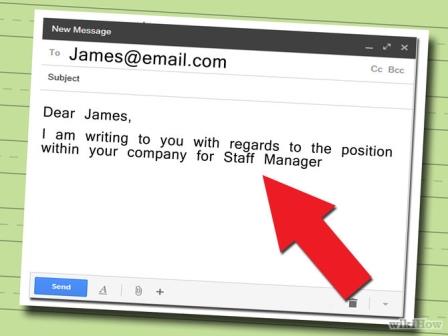Nobody prefers running behind a job. Scouring through online employment sheets, preparing for stress interviews — none of it is enjoyable.
However, maybe the most difficult piece of the puzzle is composing a successful cover letter. There are lot of conflicting views out there, hence, it is difficult to know where to begin.
Surely, during the era of digital correspondence, many might question the necessity of a cover letter.
 So, What is a Cover letter:
So, What is a Cover letter:
A cover letter introduces you, clarifies your motivation behind writing, highlights a couple of your encounters or aptitudes, and seeks an opportunity to meet personally with the potential boss.
You may be seeking a particular, advertised occupation, or you may be getting in touch with a potential manager to check whether they have any opportunities. In any case, your cover letter need to:
- Introduce you
- State the job you’re expecting
- Match your aptitudes and skills with the pre-requisites of vacant position/s
- Initiate the reader to consider your resume
- Complete with a suggestion to take action (e.g., asking for a meeting)
Tips for Writing a Cover Letter for a Resume:
1. Do primary research:
Before you begin composing your cover letter, do a proper research about the organization and the particular occupation you are applying for.
Take a look at the organization’s site, its officials’ Twitter feeds, and representative profiles on LinkedIn.
Do some research beyond details about the job description. Discover what challenges the organization is confronting and how your participation would help address those.
Knowing the organization better, additionally helps you settle on the right tone to use in your presentation document.
Consider the working environment of the association you will be working with. If you sought after to a creative agency, like a design shop, you may go out on a limb to bag the job. However if it is a monotonous institution like a bank, you may withdraw yourself.
2. Make the opening strong:
Lead with an effective opening sentence. Begin with the punch line — why this employment is appealing to you and why you’re a good fit for it.
Odds are employer is going through a heap of these, so you need to catch their attention. In any case, don’t attempt to be funny.
Humour can often be self-destructive. Stay far from normal clichés, as well. Say something that is direct and dynamic. If that you have an individual association with the organization or somebody who is employed there, additionally specify it in the first sentence or two.
Also address your letter to the respective person directly. With social networking, there’s no reason to not have the capacity to discover the name of the employer.
3. Make your letter speculative:
The principal dependable guideline in drafting a cover letter is to address the organization formally and directly.
You ought to make sure to direct your cover letter to a particular individual, as well. If the recruiting personnel or point of contact is not clearly expressed, utilize the internet or call the organization specifically to get the contact individual’s name and title.
This will not only demonstrate your enthusiasm for the position to the manager, additionally your earnestness as a competitor.
It is critical to be succinct in requesting a meeting. The purpose of the cover letter is to convince the manager that you are the most ideally equipped contender for the occupation.
4. Address your letter aptly:
 Abstain from addressing your letter “To Whom so ever It May Concern“.
Abstain from addressing your letter “To Whom so ever It May Concern“.
Figure out whom to deliver your letter, it requires a tiny bit of exertion, yet it is justified, despite all the trouble.
If you have learnt about the job through an advertisement, the commercial will likely name a man to send the application to. If not, call the administration office (don’t email them) and ask who to send the application to.
If you know the name of the recruiting officer, you should begin your letter with something like “Dear [insert name]“.
Make a point to address the personnel formally using his/her respective title. If you are unsure of the names of the recruiting personnel, consider using their titles or designations”
5. Highlight personal achievements:
Employers search for individuals who can help them take care of the critical issues. Drawing on the research you did prior to applying for the job, demonstrate that you comprehend what the organization does and possess the potential to resolve some of the difficulties it confronts.
These don’t have to be particular. However, you may specify some misfortunes that have affected their business.
Discuss how your experience has prepared you to address those issues; maybe clarify how you tackled a comparable issue in the past or offer an important achievement.
6. Be enthusiastic:
Make it clear why you need the position. In today’s economy, many individuals have the right aptitudes, so recruiters need somebody who truly needs the job. Enthusiasm sets across your identity. Being enthusiastic helps you get the job offer.
You’re the business pioneer, set benchmarks that others can cherish. Don’t try applying in case you’re not drifted towards a certain role or function. Delivering 100 resumes is an exercise in futility.
Find 10 organizations of your priority you need to work for and put all your efforts into them. In the meantime, don’t run over the edge with the sweet talk or say anything you don’t mean.
Legitimacy is urgent. Be proficient and mature. In a few businesses, it is more appropriate to say that how much you cherish an organization’s product or services.
A general guideline is to utilize just the sort of dialect that the recruiter would use with one of his clients.
7. Keep it short:
 A great part of the guidelines out there tells you to keep the cover letter under a page. Experts are also of the opinion that shorter is better.
A great part of the guidelines out there tells you to keep the cover letter under a page. Experts are also of the opinion that shorter is better.
Most cover letters submitted are seen to be excessively long. It ought to be sufficiently short so that somebody can read it quickly. You do need to accommodate a lot of details yet you ought to do it compactly.
8. Forward it cautiously:
Numerous organizations now utilize online application frameworks that don’t consider a cover letter.
You may have the capacity to incorporate one in the same document as your résumé however that is not a surety.
Particularly in light of the fact that a few online portals take into account information to be gone into particular boxes prescribed, there is seldom a scope to present a cover letter.
In these cases, utilize the format you’re given to show your capacity to carry out the employment and your excitement for the part.
If possible, you may attempt to discover somebody who you can send a short catch up email highlighting a couple of key focuses about your application.
9. Frame a final paragraph:
This is where you conclude your letter and plan how you will continue with the application.
Mention in a sentence or two why you feel you’re fit for the position. Discuss what you’ll do next and elaborate on your future prospects.
In case you anticipate catching up with the employer in a week or two, incorporate a particular date.
Else, simply say that you look forward to an interview for the position and discussing about your capabilities further. Give your contact data.
Make sure you provide your email address and contact number so the person can get in touch with you when necessary. Also, mention that the letter encloses your resume or references (if relevant). Thank the individual for his/her time.
Writing a Cover Letter for Non-advertised Jobs:
Sometimes, you might be interested in seeking a job with an organization that hasn’t advertised for any of its positions.
Reaching these organizations directly to inquire as to whether they have any employments accessible is the right thing to do. It can demonstrate an abnormal state of inspiration and enthusiasm, and could even fetch the desired job.
Regardless of the fact that there’s no job presently accessible, there’s a chance they could keep your details on record and contact you when an opening is available. This sort of cover letter must be composed in the same manner as a general cover letter, however with a couple of modifications in cover letter.
If you don’t hear from the company soon, you can always avail the option of calling or reaching them through mail inorder to discuss your letter directly.
Conclusion:
REMEMBER, a cover letter commonly goes with every resume you submit. However, a cover letter ought to supplement, not copy, your resume.
Your cover letter may have the effect between getting a prospective employee meet-up or having your resume disregarded, so it essential to draft a flawless and effective cover letter.
Its intention is to highlight the information given in the resume and give it a personal touch. A cover letter is regularly your earliest contact with a potential recruiter, making a early impression that can decide your fate.







































